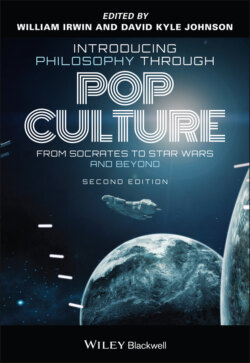Читать книгу Introducing Philosophy Through Pop Culture - Группа авторов - Страница 25
Deductions and Inductions
ОглавлениеBroadly speaking, there are two kinds of arguments, deductive arguments and inductive arguments. In deductive arguments, the speaker intends the conclusion to follow from the premises with absolute certainty such that, if all of the premises are true, then the conclusion must be true without any doubt whatsoever. To say that a conclusion follows from a premise means that we are justified in having reasoned appropriately from one claim (the premise) to another claim (the conclusion). Cartman puts forward a deductive argument in “The Tooth Fairy Tats 2000” episode that goes something like this:
Premise 1: If the boys combine their lost teeth, then they'll get money from the Tooth Fairy
Premise 2: If they get money from the Tooth Fairy, then they can buy a Sega Dreamcast
Conclusion: Hence, if the boys combine their lost teeth, then they can buy a Sega Dreamcast
We can see that, provided that the two premises are true, the conclusion absolutely must be true. We can also see that there is no other conclusion that could correctly be drawn from these premises. In fact, from looking at the premises alone you know the conclusion before even seeing it. The previous argument about Jews apologizing for Jesus's death is also a deductive argument. Just like with the Tooth Fairy argument, if all the premises are true then the conclusion must be true, there is no other conclusion that possibly could be drawn from the premises, and you know exactly what the conclusion is without even seeing it.
In inductive arguments, the speaker intends the conclusion to follow from the premises with a degree of probability or likelihood such that, if all of the premises are true, then the conclusion probably or likely is true, but it is still possible that the conclusion is false. In the “Towelie” episode, the boys notice that when they speak about anything having to do with towels, Towelie shows up, and so they reason like this:
Premise 1: Because in the past, when we mentioned towel‐related things, Towelie showed up
Premise 2: And because we will mention something towel‐related now
Conclusion: We can conclude that Towelie will show up
We can see that, provided the premises are true, the conclusion is probably or likely true, but not definitely true. It makes sense to conclude that Towelie will show up, given past experience. But the truth of Towelie showing up in the past does not guarantee that, with absolute certainty or without a doubt, Towelie will show up. It is still possible that Towelie will not show up, so the conclusion is merely probable or likely. In the episode, Towelie does show up, but he need not necessarily have shown up.
Consider Stan's reasoning at the end of the episode “Scott Tenorman Must Die” after it has been revealed that Cartman orchestrated the death of Scott's parents, the subsequent addition of their bodies to the chili, and Radiohead's witnessing the entire event so as to make fun of Scott for being a woosie.
Premise 1: Since Cartman does horrible things to people for minor offenses (like being cheated out of $16.12)
Premise 2: And since we (the boys) commit, at least, minor offenses against Cartman frequently, and he may retaliate like he did with Scott
Conclusion: Therefore, we had better not piss Cartman off in the future, for fear of retaliation
Again, even if both of the premises are true, it does not follow with absolute certainty that the boys had better not piss off Cartman in the future. In fact, as it turns out, the boys piss off Cartman numerous times without receiving the kind of retaliation given poor Scott Tenorman. So, the conclusion is false.
